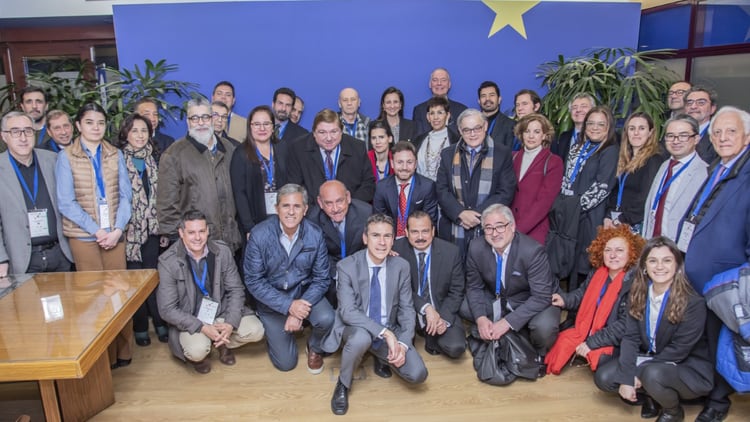The Diplomat
Sevgil Musaieva, editor of Ukrainska Pravda, stressed yesterday, during the opening of the 6th CELAC-EU Media Editors’ Congress, the danger of ignoring that “the war against Ukraine is hybrid, because Russia not only sends its soldiers to attack the country, but also manipulates information and with it the minds of citizens in order to obtain the support it needs”.
The Ukrainian journalist focused her speech on “how can you do objective journalism when your country is at war” and emphasised that journalism must be financed so that it does not fall into propaganda and is always truthful and reliable information.
In her speech, Musaieva gave several examples to illustrate the current situation in Ukraine and how journalists have to deal with it, with conflicts such as publishing a list of names of Russian military personnel, knowing that their families will now be in danger, or telling the story of a friend who has been captured and tortured, despite the fact that his family does not want to for fear of the consequences.
Casa de América was yesterday, as its director Enrique Ojeda said, the “stage for debate on the new construction of the media, to favour transparency, democracy and peace”.
The inauguration also featured speeches by the co-directors of the Congress, Alberto Barciela and Carlos Mora, who expressed their concern for the future of the media. Barciela stressed that “we must change the model, even if this means taking risks”. For his part, Mora pointed out that a “critical and participative spirit is necessary to find the answers we are looking for”.
Gabriela Mistral Amphitheatre at Casa de América hosted the round tables “The art of communication in history. Precedents”; “The fourth executive power, public communication. Perspective from reality”; and “The State of the Question. Contemporary truth. A new reality in Ibero-America: change of government in Chile, Colombia, Ecuador, Peru…”, to understand the situation of journalism on both sides of the Atlantic.
The editors shared their opinions and experiences, contributing their vision and what is happening where their respective media operate. Among the conclusions offered was the idea that journalism is still active, but that it needs to reinvest itself to see which path to follow now, focusing above all on social networks and the digital era.
To close the morning, Eduardo Navarro, Director of Strategy and Corporate Affairs at Telefónica, welcomed the congress participants to its headquarters, before whom he pointed out that the great challenge now facing us is that “information is not knowing how to monetise“, despite the fact that “the media and being connected with current affairs are a necessity for the population”.
European Freedom of the Media Act
The delegates, who came from around twenty European and Latin American countries, were received on their arrival on Tuesday at the headquarters of the Delegation of the European institutions in Madrid. The director of the European Parliament’s office in Spain, María Andrés, reviewed the different initiatives being carried out by the EU to fight for the freedom of journalists, among which she highlighted the future European Freedom of the Media Act, which will protect journalists from the “involution that freedom of information has suffered”.
The President of the EUROLAT Assembly, Javier López, remarked that the work of good journalists brings peace and democracy, while the co-directors of the Congress recalled the “importance of speaking freely about freedom” (Alberto Barciela) and that “the person comes first and then the journalist, since no dead man writes news” (Carlos Mora).
Yago González, CEO of Prestomedia Grupo, presented the “Atlas of bi-regional interests 2023”. A study carried out by the Institute for International Foresight which, based on the analysis of 53,833,452,771 searches on the Internet, shows that we are in a moment of transition in the way we communicate and receive information. For the first time, tourism has become one of the most searched for information on Latin America by Europeans, while the war situation in Europe has made this topic one of the most searched for by Latin American citizens.
The event closed with a speech by the Vice-President of the Assembly of the Council of Europe, Antonio Gutiérrez Limones, who stressed that a choice must be made between democracy or autocracy, and recalled that “we are in a world that is going to change, because it is very unequal. For this reason, he said, “we must make a pact on migration if we want a better world”.
6th Congress tribute to Javier Moll and Arantza Sarasola
The day ended with a tribute to Javier Moll and Arantxa Sarasola, President and Vice-President of Prensa Ibérica, for their 45 years in journalism. Both stressed that “journalism connects the EU with the peoples of Latin America, to whom we are united by culture, history and personality” and claimed that “there is no democracy if we do not give women the place they deserve in terms of justice and ability”.
In addition, Jaume Duch, spokesperson and Director General of Communication of the European Parliament, addressed the participants through a video in which he recalled the three main axes of the European Union for 2023: reaching climate neutrality in 2050; migration policy; and strengthening the economic and business fabric of the EU.





